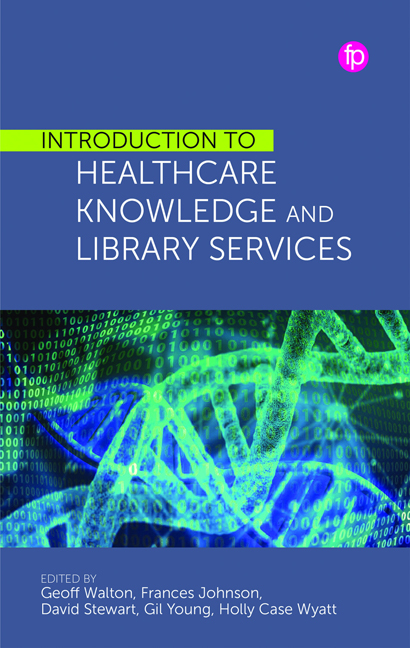Book contents
- Frontmatter
- Contents
- Figures, Tables and Case Studies
- Notes on Contributors
- Foreword
- How to Use this Book
- 1 An Introduction to Healthcare Knowledge and Library Services
- 2 Strategic Development for Healthcare Knowledge and Library Services
- 3 Exploring the Training and Development Needs of the Healthcare Knowledge and Library Services Workforce: A Case Study
- 4 Advocacy and How Knowledge and Library Specialists Tailor Services to Meet the Needs of Their Stakeholders
- 5 Mobilising Evidence and Knowledge
- 6 Internal and External Partnerships
- 7 Health Literacy, Patient Information and Combating Misinformation
- 8 Resource Discovery and Open Access
- 9 Growing the Evidence Base in Healthcare Knowledge and Library Services
- 10 Measuring Progress, Value and Impact in NHS Knowledge and Library Services
- 11 Reflective Practice in Healthcare Settings
- 12 Looking to the Future of Healthcare Knowledge Services
- Index
5 - Mobilising Evidence and Knowledge
Published online by Cambridge University Press: 22 February 2024
- Frontmatter
- Contents
- Figures, Tables and Case Studies
- Notes on Contributors
- Foreword
- How to Use this Book
- 1 An Introduction to Healthcare Knowledge and Library Services
- 2 Strategic Development for Healthcare Knowledge and Library Services
- 3 Exploring the Training and Development Needs of the Healthcare Knowledge and Library Services Workforce: A Case Study
- 4 Advocacy and How Knowledge and Library Specialists Tailor Services to Meet the Needs of Their Stakeholders
- 5 Mobilising Evidence and Knowledge
- 6 Internal and External Partnerships
- 7 Health Literacy, Patient Information and Combating Misinformation
- 8 Resource Discovery and Open Access
- 9 Growing the Evidence Base in Healthcare Knowledge and Library Services
- 10 Measuring Progress, Value and Impact in NHS Knowledge and Library Services
- 11 Reflective Practice in Healthcare Settings
- 12 Looking to the Future of Healthcare Knowledge Services
- Index
Summary
Introduction and strategic context
Regarding mobilising evidence and knowledge, Knowledge for Healthcare states:
… healthcare is a knowledge industry. Decisions are not made in isolation but must take account of individual and organisational knowledge as well as the best available evidence. NHS knowledge specialists enable decision makers to take account of this full continuum. They also nurture a learning culture which is critical to transformation, efficiency and innovation within the NHS.
(Health Education England, 2021)This opens up the role of knowledge and library specialists to become active partners, along with clinical and managerial colleagues, in the use of evidence and knowledge by healthcare organisations. It allows them to contribute by not only providing easy access to published information and evidence, but also to play a key part in making it useful and usable and facilitating the better capture and use of knowledge gained in the organisation.
As Knowledge for Healthcare and the National Institute for Health Research acknowledge:
… evidence does not speak for itself but needs to be mobilised at the right time, and through the right people, to make a difference in decision making.
(National Institute for Health Research, 2013)While evidence-based practice is seen as the gold standard in healthcare organisations and people are willing in principle to use evidence in their decision-making, the practical challenges of doing so are where the skills of knowledge specialists can make a difference.
The role of mobilising evidence and knowledge requires skills in the use of information, as well as skills in using the technology to harness it. It involves working as an embedded part of teams, including clinical, managerial, policy development and project teams. As well as honing search skills to find the right information, knowledge specialists working in this space find themselves called upon to summarise and present the evidence in a digestible format to help take the ‘heavy lifting’ out of getting the evidence into practice (Economics by Design, 2020).
Although this chapter does not cover the concept of mobilising computable biomedical knowledge, it is worth noting that this too is an area of increasing interest where knowledge specialists’ skills are relevant and there are likely to be developments here in the future. Technical and information skills, such as semantic web standards and knowledge of taxonomy and metadata, are being called upon to help in organising individual, actionable units of knowledge.
- Type
- Chapter
- Information
- Publisher: FacetPrint publication year: 2024



